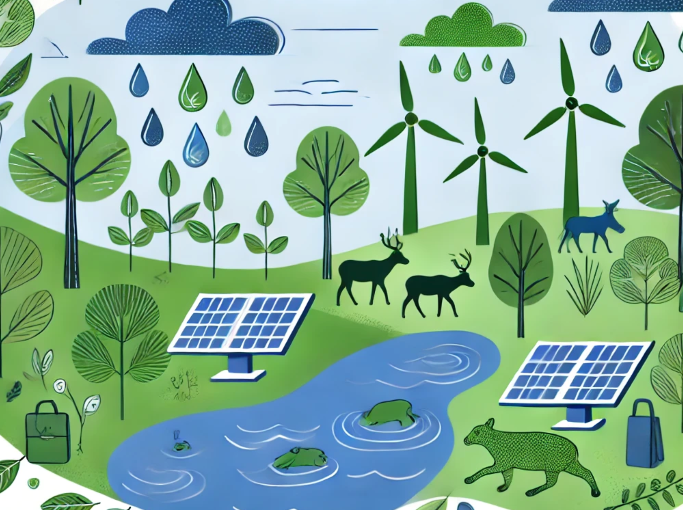As the world grapples with environmental challenges like climate change, biodiversity loss, and pollution, careers in environmental studies and ecology are more important than ever. These fields offer diverse and impactful career paths that allow individuals to make a tangible difference in preserving our planet. For students interested in understanding ecosystems, promoting sustainability, and advocating for the environment, here’s a guide to some of the major careers in environmental studies and ecology.
- Environmental Scientist
Environmental scientists study and analyze the environment to identify, understand, and address ecological and human-made problems. They collect data, conduct fieldwork, and develop solutions to reduce pollution, protect resources, and mitigate the impacts of climate change. This career combines field research with data analysis, making it ideal for those who enjoy hands-on science with real-world applications. - Ecologist
Ecologists study ecosystems and the relationships between organisms and their environments. They may work in various settings, from national parks to laboratories, researching topics such as biodiversity, population dynamics, and ecosystem health. Ecologists play a vital role in conservation efforts, helping to preserve species and habitats under threat from human activities. - Conservation Biologist
Conservation biologists focus on protecting biodiversity by developing strategies to conserve species, habitats, and ecosystems. They may work with government agencies, NGOs, or wildlife organizations to address threats like habitat loss and climate change. Conservation biologists are essential for developing action plans to restore ecosystems and protect endangered species. - Environmental Engineer
Environmental engineers apply engineering principles to address environmental issues. They design systems to manage waste, reduce pollution, and conserve resources. This field often involves developing water treatment plants, air pollution control systems, and sustainable waste disposal methods. Environmental engineers are problem-solvers who contribute directly to creating cleaner and more sustainable environments. - Wildlife Biologist
Wildlife biologists study animal populations, behaviors, and habitats, working to protect wildlife and their ecosystems. They may conduct field research, monitor endangered species, and develop conservation strategies. Wildlife biologists are crucial for understanding how human activities impact wildlife and advising on measures to reduce harm and protect biodiversity. - Climate Scientist
Climate scientists study the Earth’s climate and work to understand the causes and effects of climate change. They analyze data from sources like satellite imagery and climate models to predict future climate scenarios. This field is critical as scientists work to provide data that informs policies and actions to mitigate climate change’s effects on ecosystems, weather patterns, and human populations. - Environmental Policy Analyst
Environmental policy analysts research and advocate for policies that protect the environment. They work with government agencies, NGOs, and think tanks to analyze the effectiveness of environmental regulations, recommend improvements and promote sustainable practices. Policy analysts are instrumental in shaping laws and policies that aim to reduce environmental harm and encourage conservation. - Environmental Consultant
Environmental consultants work with businesses, governments, and nonprofits to help them comply with environmental regulations and implement sustainable practices. They assess environmental impacts, conduct site assessments, and advise on how to minimize damage. Environmental consulting is a growing field, especially as industries seek ways to reduce their ecological footprints and comply with environmental laws. - Urban Planner
Urban planners design and develop urban areas with a focus on sustainability and livability. They consider environmental impacts, green spaces, and transportation systems when planning city layouts. Urban planners play a key role in making cities more sustainable by promoting efficient land use, minimizing environmental impacts, and encouraging green building practices. - Environmental Educator
Environmental educators raise awareness about environmental issues and conservation practices through teaching and outreach. They work in schools, museums, nature centers, and parks, engaging people of all ages in learning about ecology, sustainability, and environmental stewardship. Educators inspire the next generation to care for the planet and adopt sustainable habits. - Forestry and Conservation Manager
Forestry and conservation managers oversee forests, parks, and other natural resources, ensuring they are sustainably managed. They may work with public agencies or private organizations to maintain forest health, prevent fires, and promote biodiversity. This career is ideal for those who enjoy working outdoors and are passionate about preserving natural landscapes. - Sustainability Specialist
Sustainability specialists work with organizations to create and implement sustainable practices. They help businesses reduce waste, improve energy efficiency, and develop sustainable supply chains. Sustainability specialists play a crucial role in guiding companies toward environmental responsibility and ensuring that their operations align with sustainable values. - Marine Biologist
Marine biologists study life in oceans and other saltwater environments. They may research marine organisms, ecosystems, and the impacts of pollution on marine life. This field is essential for protecting ocean biodiversity, understanding the effects of climate change on marine habitats, and developing strategies to preserve ocean health. - Soil and Plant Scientist
Soil and plant scientists study soil composition and plant growth, helping to improve agricultural productivity and conservation. They work on sustainable farming practices, soil health, and the development of crops that require fewer resources. Soil and plant scientists contribute to food security and environmental health through sustainable agriculture practices. - Environmental Health and Safety Specialist
Environmental health and safety specialists focus on protecting human health from environmental hazards. They identify risks related to pollution, chemicals, and waste, developing safety protocols to minimize exposure and harm. This role is crucial in industries like manufacturing, where specialists help ensure safe, environmentally responsible operations. - Renewable Energy Specialist
Renewable energy specialists work on developing and implementing renewable energy sources, such as solar, wind, and geothermal power. They research and design energy systems that reduce reliance on fossil fuels, contributing to efforts to reduce greenhouse gas emissions and combat climate change. This field is rapidly growing as more countries invest in clean energy. - Hydrologist
Hydrologists study water resources, including rivers, lakes, and groundwater. They analyze how water moves through ecosystems, examining the effects of human activities on water quality and availability. Hydrologists are essential for managing water resources sustainably, especially in regions facing water scarcity. - Environmental Lawyer
Environmental lawyers advocate for environmental protection through legal channels. They may work with nonprofits, government agencies, or private firms to address environmental violations, draft regulations, and represent cases related to conservation and pollution control. Environmental lawyers are key in shaping environmental laws and defending ecological rights. - Ecotoxicologist
Ecotoxicologists study the effects of toxic chemicals on the environment and wildlife. They assess pollution impacts on ecosystems, helping to create policies that limit harmful chemical exposure. This career is essential for protecting biodiversity and public health from the adverse effects of pollution. - Energy Auditor
Energy auditors assess buildings and facilities to evaluate energy efficiency and recommend improvements. They conduct inspections, analyze energy use, and suggest ways to reduce energy consumption. Energy auditors help organizations and individuals reduce costs, conserve resources, and contribute to sustainability goals.
Conclusion: Making a Difference for the Planet
Careers in environmental studies and ecology offer meaningful ways to make a positive impact on the world. Whether you’re interested in field research, policy advocacy, or sustainable design, these professions contribute to a more sustainable, healthier planet. For those passionate about protecting ecosystems and promoting environmental responsibility, these 20 careers are just the beginning of a rewarding journey.

Dennis Boakye ’26 is a rising junior with a major in Neuroscience and a minor in Mathematics. He is also a co-president of the Neurolawrence Club and the Synthetic Biology Club and the treasurer for the American Medical Student Association (AMSA, Lawrence Chapter) and the Black Student Union (BSU). Dennis is the current career peer educator for the Health and Medicinal Professions (HMP) and the Physical and Natural Sciences (PHN) career communities at Lawrence University. Connect with Dennis on LinkedIn.
